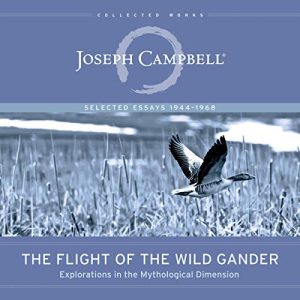The Flight of the Wild Gander Audiobook: Soaring Through Myth and Meaning
The opening chords of The Flight of the Wild Gander Audiobook felt like stepping into an ancient forest, where every rustle of leaves whispered stories as old as humanity itself. Joseph Campbell’s voice – though brought to life here by the masterful narration of James Anderson Foster – has always carried a kind of mythic weight for me. His works, rich with archetypal wisdom and cross-cultural exploration, have a way of unearthing the deep roots that connect us all. As I pressed play, I found myself not just embarking on an audiobook journey but preparing to traverse a landscape where myth meets the marrow of human experience.
Listening to this collection of essays felt akin to being guided through an ancient labyrinth, with Campbell as the sage and Foster as the bard who carries his torch. From Grimm’s fairy tales to Native American legends, Campbell examines mythology not as mere relics of bygone eras but as living, breathing entities that evolve alongside us. The essays, originally written between 1944 and 1968, capture Campbell’s early groundbreaking insights into how myths emerge from both our biology and culture. This audiobook is no passive listen – it demands your attention and rewards you with revelations that linger long after.
—
James Anderson Foster deserves particular praise for his performance here. Narrating Campbell’s dense yet poetic prose is no easy feat; these essays delve into complex ideas about mythology’s origins, functions, and transformations over time. Foster strikes a delicate balance – his tone is authoritative yet approachable, his pacing deliberate without feeling sluggish. His voice carries a gravitas that mirrors Campbell’s own intellectual depth while still making room for moments of wonder and discovery. It felt as though he wasn’t merely reading but rather embodying Campbell’s role as a modern-day mythologist.
One standout essay for me was Bios and Mythos, where Campbell draws connections between biology and storytelling. He posits that myths are not just cultural artifacts but natural phenomena – an extension of our biological need to make sense of existence. This idea resonated deeply with me as someone who often seeks meaning in the chaos of modern life. It reminded me that storytelling is not just entertainment; it’s survival. Foster’s narration in this essay was particularly compelling, guiding listeners through Campbell’s intricate arguments with clarity and conviction.
Another highlight was Mythogenesis, which explores how myths are born within specific cultural contexts yet transcend those boundaries to touch something universal. Here, Campbell recounts the story of a visionary Native American medicine man whose personal experiences gave rise to a myth that endured across generations. Listening to this essay felt like peeling back layers of time to witness the alchemy by which individual experience becomes collective wisdom. It also prompted me to reflect on how our own personal stories might one day ripple outward in ways we can’t yet imagine.
But perhaps the most profound takeaway for me came from Primitive Man as Metaphysician. In this essay, Campbell argues that early humans were not merely pragmatic survivalists but philosophers in their own right – using myths to grapple with questions about existence, mortality, and transcendence. This reframing felt like an invitation to view our ancestors not through a lens of condescension but admiration. Foster’s narration imbued these passages with a quiet reverence that made them all the more impactful.
—
As much as I was captivated by The Flight of the Wild Gander Audiobook, it’s worth noting that this is not light listening material. Some sections require intense focus; Campbell’s writing assumes an audience willing to wrestle with abstract concepts and nuanced arguments. But for those willing to invest their mental energy, the rewards are immense – a deeper understanding of mythology’s role in shaping both individual psyches and collective cultures.
Campbell challenges us not just to consume myths passively but to engage with them actively – to see them as tools for navigating life’s uncertainties rather than dogmas set in stone. One particularly striking metaphor likens myths to masks worn by gods: they are symbols pointing toward truths beyond human comprehension rather than truths themselves. This perspective has shifted how I approach my own relationship with stories – whether ancient epics or modern narratives – and left me pondering what “masks” I might need to don or discard in my own life.
For anyone intrigued by spirituality, psychology, or anthropology – or simply curious about why we tell stories at all – this audiobook offers a treasure trove of insights. And thanks to its availability on Audiobooks4soul.com, you can freely immerse yourself in its world without hesitation.
—
As I reached the final moments of The Flight of the Wild Gander Audiobook, I felt like I had completed more than just an intellectual journey – I had undergone a kind of initiation into seeing mythology not as distant or irrelevant but profoundly intertwined with my everyday existence. Joseph Campbell has long been hailed as one of the great interpreters of myth, and this collection reaffirms why his work remains so essential today.
I’m already looking forward to our next foray into storyscapes – who knows what treasures await us on the horizon? Until then…
Happy listening!
Stephen











